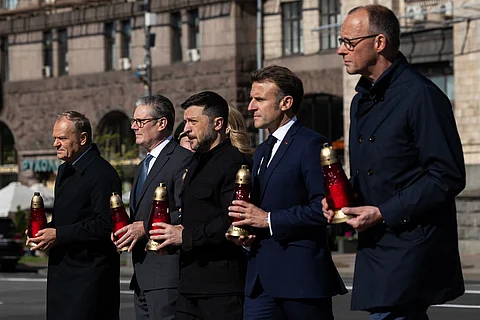

The leaders of the United Kingdom, France, Germany, and Poland arrived together in Kiev on Saturday in a unified show of support for Ukraine, meeting President Volodymyr Zelenskyy amid renewed international pressure on Russia to agree to a ceasefire and resume peace talks.
British Prime Minister Keir Starmer, French President Emmanuel Macron, German Chancellor Friedrich Merz—on his first visit to Ukraine—and Polish Prime Minister Donald Tusk joined Zelenskyy in commemorating the 80th anniversary of the end of World War II. The five leaders laid flowers at a makeshift memorial in Kiev’s Independence Square honoring Ukrainian soldiers killed in the war.
The coordinated visit came a day after Russian President Vladimir Putin hosted his allies, including Chinese President Xi Jinping, at a Victory Day parade in Moscow. The juxtaposition underscored deepening geopolitical divides as the war in Ukraine enters its third year.
In a joint statement, the European leaders reiterated their support for U.S. President Donald Trump’s push for a 30-day ceasefire in Ukraine to allow space for renewed negotiations. “We reiterate our backing for President Trump’s calls for a peace deal and call on Russia to stop obstructing efforts to secure an enduring peace,” the leaders said.
The group later held a virtual conference with Trump, where they coordinated diplomatic efforts and discussed the formation of a post-war coalition to support Ukraine’s military and security infrastructure. According to Ukrainian Foreign Minister Andrii Sybiha, who posted a photograph of the leaders seated together in Kiev, Ukraine is prepared to implement a full, unconditional ceasefire by land, air, and sea beginning Monday.
Before arriving in Kiev, a French diplomatic source indicated that if Moscow rejects the ceasefire proposal, new coordinated sanctions could be introduced by both the U.S. and European partners.
The visit coincides with a shifting diplomatic landscape in Washington. President Trump, who has distanced himself from his predecessor’s Ukraine policy, has taken a more transactional approach, including temporarily suspending military aid and later brokering a deal with Kyiv on mineral resources. His recent remarks have signaled growing impatience with what U.S. officials describe as Kremlin stalling tactics.
Trump has warned that sanctions against Russia could be intensified and has suggested that without progress, the U.S. may abandon the peace effort altogether.
Moscow has expressed conditional support for a truce. Kremlin spokesman Dmitry Peskov said Russia would consider a ceasefire only if Western military aid to Ukraine is halted, arguing that any pause in fighting without such a concession would advantage Ukrainian forces.
Military assistance from the West has been crucial to Ukraine’s defense since Russia launched its full-scale invasion in February 2022.
On Friday, as Putin celebrated Soviet victory in World War II, European foreign ministers voiced support for a special tribunal to prosecute Russian leaders for crimes of aggression. President Zelenskyy condemned the Red Square parade as a “parade of bile and lies.”
The visit to Kiev also came with heightened security concerns. The U.S. embassy issued a warning of a “potentially significant” air attack in the coming days, urging American citizens in Ukraine to be prepared to seek shelter.
Zelenskyy’s chief of staff, Andriy Yermak, underscored the stakes. “There is a lot of work to do, a lot of topics to discuss. We must end this war with a just peace,” he wrote on Telegram. “We must force Moscow to agree to a ceasefire.”
Following their visit, the leaders are expected to brief other nations on plans to build a future multinational force capable of supporting Ukraine’s defense and overseeing any future peace agreement.
The visit concluded as a Russian-declared ceasefire marking Victory Day came to an end. Ukraine had refused to recognize the truce, dismissing it as a political maneuver, and both sides have accused each other of violating it.